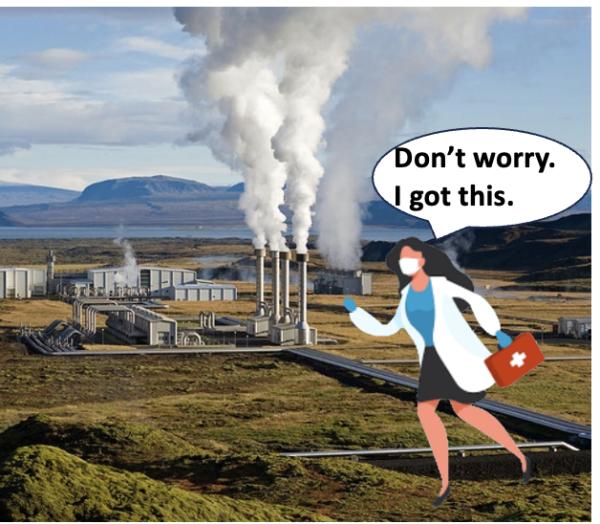Environmental impact analyses make sense to a certain extent. A transportation megaproject surely will disrupt ecosystems and threaten wildlife. Interstate highways, for example, routinely cut through habitats in which (sometimes very large) animals roam, posing a lethal threat not only to the animals but to human drivers. Building sustainably is undeniably important for a healthy planet.
Much of the time, however, environmental impact analyses make little sense at all. In Washington State, an analysis was required for a bridge being built to replace another bridge. In situations like this, environmental impact analyses only serve to create delays and inflate costs unnecessarily. Yet, a perspective published in the New England Journal of Medicine (NEJM) argues that we need more of them — specifically, for clinical trials.
Carbon footprints for clinical trials?
The article begins inauspiciously: “Human-induced climate change and destruction of nature is a global health emergency.” No, it isn’t, at least not by any reasonable definition of “emergency.” Just because something is important and needs to be addressed (like the U.S. national debt or North Korean dictator Kim Jong-Un randomly firing missiles toward Japan when he gets angry) does not make it an emergency.
According to the World Health Organization, a public health emergency of international concern is “an extraordinary event which is determined to constitute a public health risk to other States through the international spread of disease and to potentially require a coordinated international response.”
Moreover, an emergency is also “serious, sudden, unusual, or unexpected.” At least three of those do not apply. (The reader can decide which three.) COVID was a clear example of a public health emergency; climate change is not. The only thing hyperbolic language accomplishes is decreasing the credibility of the journal. But the authors march on:
“[K]nowledge about the carbon footprints of existing health care interventions and how best to assess the environmental effects of new tests, treatments, and services in relation to their clinical benefits has been limited.”
Research on the topic is limited because the question is stupid, akin to asking whether we should examine the impact of ambulances on global temperature. It’s such a trivial part of the overall picture, that investigating it — let alone addressing it — is a waste of time and resources. But that is exactly what the authors propose:
“Given the immediate need for emissions reductions and to align with reporting standards in other sectors, we suggest that clinical trials include an environmental impact analysis with carbon footprint as an end point.”
Clinical trial end points are about assessing the safety and efficacy of the treatment and the health and well-being of the patient. Period.
Alas, mission creep has set in. A few clinical trials are now incorporating economic end points, namely, addressing whether new treatments are cost-effective. This makes some sense, but it distracts from the main point of the investigation, which is whether the treatment works. Cost is an important consideration, but it can be dealt with later. We should not discourage the development of new treatments simply because they might be too expensive initially. Asking clinical trials to consider carbon emissions is really losing the plot.
Fashionable nonsense
This isn’t NEJM’s first rodeo. The journal has a strange fascination with decarbonizing the healthcare sector, a problem that (1) has nothing to do with medicine, and (2) largely wouldn’t need solving if the world simply adopted nuclear power.
In its advocacy role, NEJM also plays fast and loose with the facts. A 2021 perspective stated that climate change kills millions of people per year. To back up that extraordinary claim, the authors cited research that concluded over 5 million people die from sub-optimal temperatures annually. But the authors either didn’t read or didn’t understand the paper. Of those 5 million deaths, nearly 4.6 million (92%) were due to the cold; only 8% were due to heat. Over time, fewer people have been dying from sub-optimal temperatures because, as the planet warms, the decrease in cold-related deaths is greater than the increase in heat-related deaths.
What explains all this fashionable nonsense that has infected our medical journals? As my colleague Cameron English wrote recently, “Academic journals and the researchers who publish in them are increasingly engaged in naked political advocacy rather than science.” Regarding the content of these journals, he says, "You’re just as likely to read an ill-informed opinion piece defending organic farming, gun control, and even outright Marxism as you are original research.” We can now add carbon emissions as clinical trial endpoints to the list.
Religious zeal
Though traditional religion is fading into the background in Western countries, the desire to repent for our sins remains. However, instead of moral sin, we focus on secular sin — hence, the obsession with carbon emissions in settings that make little sense. Michael Crichton summarized the modern zeitgeist best:
“We are all energy sinners, doomed to die, unless we seek salvation, which is now called sustainability. Sustainability is salvation in the church of the environment. Just as organic food is its communion, that pesticide-free wafer that the right people with the right beliefs, imbibe.”
It’s hard to disagree with Crichton’s diagnosis, particularly when the NEJM authors say things like this: “It’s been difficult to make evidence-based decisions focused on using clinically effective and climate-friendly interventions.”
If your doctor considers carbon emissions when recommending a treatment, find another doctor.




